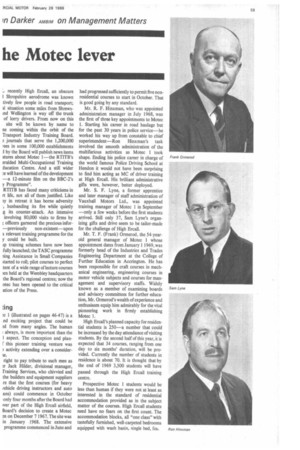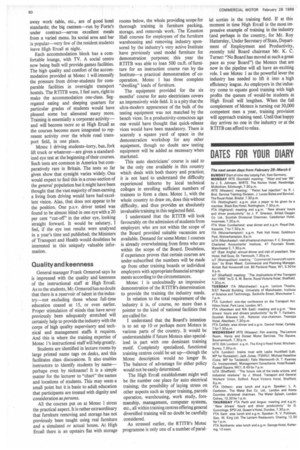attempt to get you to read
Page 60

Page 61

Page 62

If you've noticed an error in this article please click here to report it so we can fix it.
he Motec lever
1, recently High Ercall, an obscure I Shropshire aerodrome was known tively few people in road transport; 11 situation some miles from Shrewsind Wellington is way off the trunk of lorry drivers. From now on this site will be known by name to tie coming within the orbit of the Transport Industry Training Board. B journals that serve the 1,200,000 rees in some 100,000 establishments d by the Board will publish news items strifes about Motec 1—the RTITB's Braided Multi-Occupational Training ducation Centre. And a still wider :e will have learned of the development —a 12-minute film on the BBC-2's y Programme".
RTITB has faced many criticisms in rt life, not all of them justified. Like ry in retreat it has borne adversity , husbanding its fire while quietly g its counter-attack. An intensive involving 80,000 visits to firms by ; officers garnered the precious infor-previously non-existent—upon relevant training programme for the y could be built.
rp training schemes have now been fully launched; the TASC programme ning Assistance in Small Companies Aarted to roll; pilot courses to perfect tent of a wide range of lecture courses ten held at the Wembley headquarters the Board's regional centres; now the otec has been opened to the critical ation of the Press.
;c 1 (illustrated on pages 46-47) is a nd exciting project that could be Bc1 from many angles. The human
always, is more important than the 1 aspect. The conception and plan this pioneer training venture was activity extending over a considerse.
right to pay tribute to such men as .tr Jack Hilder, divisional manager, Training Services, who chivvied and the builders and equipment suppliers re that the first courses (for heavy 'chicle driving instructors and auto ans) could commence in October • only four months after the Board had iver part of the High Ercall airfield, Board's decision to create a Motec Br' on December 7 1967. The site was in January 1968. The extensive programme commenced in June and had progressed sufficiently to permit five nonresidential courses to start in October. That is good going by any standard.
Mr. R. F. Hinxman, who was appointed administration manager in July 1968, was the first of three key appointments to Motec 1. Starting his career in road haulage but for the past 30 years in police service—he worked his way up from constable to chief superintendent—Ron Hinxman's task involved the smooth administration of the multifarious activities as Motec 1 took shape. Ending his police career in charge of the world famous Police Driving School at Hendon it would not have been surprising to find him acting as MC of driver training at High Ercall. His brilliant administrative gifts were, however, better deployed.
Mr. S. F. Lyne, a former apprentice and later manager of staff administration of Vauxhall Motors Ltd., was appointed training manager of Motec I in September —only a few weeks before the first students arrived. Still only 37, Sam Lyne's organizing gifts and drive seem to be tailor-made for the challenge of High Ercall.
Mr. T. F. (Frank) Ormerod, the 54-yearold general manager of Motec 1 whose appointment dates from January 11969, was formerly head of the Industries and Trades Engineering Department at the College of Further Education in Accrington. He has been responsible for craft courses in mechanical engineering, engineering courses in motor vehicle subjects and courses for management and supervisory staffs. Widely known as a member of examining boards and advisory committees for further education, Mr. Ormerod's wealth of experience and enthusiasm equip him admirably for the vital pioneering work in firmly establishing Motec I.
High Ercall's planned capacity for residential students is 250—a number that could be increased by the day attendance of visiting students. By the second half of this year, it is expected that 34 courses, ranging from one day to six months' duration, will be provided. Currently the number of students in residence is about 70. It is thought that by the end of 1969 3,500 students will have passed through the High Ercall training centre.
Prospective Motec 1 students would be less than human if they were not at least as interested in the standard of residential accommodation provided as in the subject matter of the courses. High Ercall students need have no fears on the first count. The accommodation blocks, all "one class" with tastefully furnished, well-carpeted bedrooms equipped with wash basin, single bed, fok away work table, etc., are of good hotel standards; the big canteen—run by Forte's under contract—serves excellent meals from a varied menu. Its social area and bar is popular—very few of the resident students leave High Ercall at night.
Each accommodation block has a comfortable lounge, with TV. A social centre now being built will provide games facilities. The high quality and comfort of the accommodation provided at Motec 1 will intensify the pressure from driver-students for comparable facilities in overnight transport hostels. The RTITB were, I feel sure, right to make the accommodation one-class. Segregated eating and sleeping quarters for particular grades of students would have pleased some but alienated many more. Training is essentially a corporate activity— and will become more so at High Ercall as the courses become more integrated to represent activity over the whole road transport field, in one place.
Motec 1 driving students—lorry, bus, fork lift truck or whatever—are given a standardized eye test at the beginning of their courses. Such tests are common in America but comparatively rare in Britain. The tests so far given show that eyesight varies widely. One would expect to find this in a cross-section of the general population but it might have been thought that the vast majority of men earning a living from driving would have had excellent vision. Alas, that does not appear to be the position. One p.s.v. driver tested was found to be almost blind in one eye with a 20 per cent "cut-off' in the other eye, looking straight forward. It would be salutary, I feel, if the eye test results were analysed in a year's time and published; the Ministers of Transport and Health would doubtless be interested in this uniquely valuable information.
Quality and keenness
General manager Frank Ormerod says he is impressed with the quality and keenness of the instructional staff at High Ercall. As to the students, Mr. Ormerod has no doubt that there is a reservoir of talent in the industry—not excluding those whose full-time education ceased at 15, or even earlier. Proper stimulation of minds that have never previously been adequately stretched will certainly help to provide the industry with the corps of high quality supervisory and technical and management staffs it requires. And this is where the training expertise of Motec l's instructional staff will help greatly.
Students are identified in lecture rooms by large printed name tags on desks, and this facilitates class discussions. It also enables instructors to identify students by name— perhaps even by nickname! It is a simple matter for the lecturer to "chart" the names and locations of students. This may seem a small point but it is basic to adult education that participants are treated with dignity and consideration as persons.
All the courses put on at Motec 1 stress the practical aspect. It is rather extraordinary that furniture removing and storage has not previously been taught using real furniture and a simulated or actual house. At High Ercall there is an upstairs flat with storage rooms below, the whole providing scope for thorough training in furniture packing, storage, and removals work. The Knuston Hall courses for employees of the furniture warehousing and removing industry spon sored by the industry's very active Institute have previously used model furniture for demonstration purposes; this year the
RTITB was able to loan 500 cu.ft. of furniture for an instruction course run by the Institute—a practical demonstration of cooperation. Motec 1 has three complete -dwelling" loads of furniture.
The equipment provided for the six months' course for auto electricians covers an impressively wide field. It is a pity that the ultra-modern appearance of the bulk of the testing equipment was not matched by the bench vices. In a productivity-conscious age one would have thought that quick-release vices would have been mandatory. There is scarcely a square yard of space in the demonstration workshop for any other equipment, though no doubt new testing equipment will be added as necessary when marketed.
This auto electricians' course is said to be the only one available in this country which deals with both theory and practice; it is not hard to understand the difficulty experienced hitherto by local technical colleges in enrolling sufficient numbers of trainees to form a class. Motec 1, with the whole country to draw on, does this without difficulty, and thus provides an absolutely invaluable training in this neglected field.
I understand that the RTITB will look favourably on the admission of students from employers who are not within the scope of the Board provided suitable vacancies are available. Demand for some Motec 1 courses is already overwhelming from firms who are within the scope of the Board. Doubtless, if experience proves that certain courses are under-subscribed the numbers will be made up from other training boards or individual employers with appropriate financial arrangements according to the circumstances.
Motec 1 is undoubtedly an impressive demonstration of the RTITB's determination to provide the training the industry needs.
In relation to the total requirement of the industry it is, of course, no more than a pointer to the kind of national facilities that are called for.
I understand that the Board's intention is to set up 10 or perhaps more Motecs in various parts of the country. It would be understandable if future Motecs also specialized in part with one dominant training motif. Completely specialized, functional training centres could be set up—though the Motec description would no longer fit. The balance of advantage for either policy would not be easily determined.
The High Erc all establishment might well be the number one place for auto electrical training; the possibility of laying stress on other aspects such as tipper training, parcels operation, warehousing, work study, fore manship, management, computer systems, etc., all within training centres offering general diversified training will no doubt be carefully considered.
As stressed earlier, the RTITB's Motec programme is only one of a number of paral
lel sorties in the training field. If at this moment in time High Ercall is the most impressive example of training in the industry (and perhaps in the country, for Mr. Roy Hattersley, Under Secretary of State, Department of Employment and Productivity, recently told Board chairman Mr. K. C. Turner: "No Board has moved at such a great pace as your Board") the Motecs that are now in the pipeline will all have an exciting role. I see Motec 1 as the powerful lever the industry has needed to lift it into a high efficiency league. As employers in the industry come to equate good training with high profits the queues of would-be students at High Ercall will lengthen. When the full complement of Motecs is turning out 30,000 competent men a year, training provision will approach training need. Until that happy day arrives no one in the industry or at the RTITB can afford to relax.








































































































